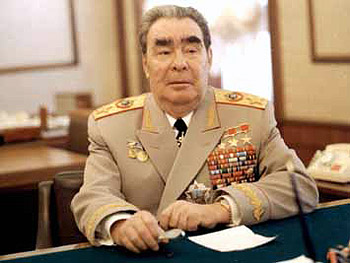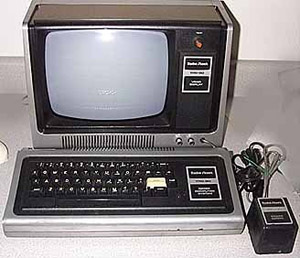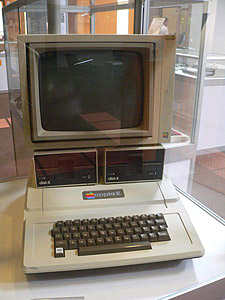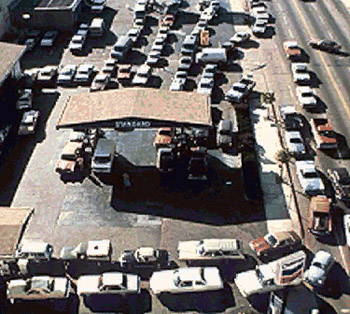Trying to remember what I could recall about and also considering historical treatments of the 1970s, I came up with these four major issues that fit with some of the themes of this course.
- Détente was a thaw in the Cold War that was later undone as a result of Soviet activity in what was then called the Third World and the Soviet invasion of Afghanistan.
- Human rights entered the foreign policy lexicon as a result of the Helsinki Accords and the work of President Carter.
- Technological innovation took a big step forward with the appearance of the the first PCs.
- A dramatic shift occurred in the the global economy.
- Pop culture is everywhere, especially on television.
![]()
Détente, 1969-1975
Détente was the big thing going internationally in the beginning of 1970. I am not sure who first used the term, but it is French and means a relaxing or easing of tensions--The Russians referred to it as the разрядка (razriadka). In the context of the Cold War, detente meant a lessening of tension between the USSR and the US and, to a lesser extent, between the US and communist China also. The culmination of detente occurred in 1972 with the signings of the SALT I treaty (see below), the Anti-Ballistic Missile Treaty and the Biological Weapons Convention.
In addition to the political achievements, detente also meant that all kinds of cultural exchanges began between Russia and the United States. For example, it became easier for historians to go to Russian to do research in Russian archives. Dance groups, orchestras, ballet troupes, youth groups came and went, back and forth, between the two countries.
There were a number of reasons for the easing of Cold War hostilities:
- The horrors of the Vietnam War (and, thus, the real price of combating communism) shocked the American people.
- The Vietnam War and the costs of deploying new multi-warhead nuclear missiles skyrocketed, leading to huge government deficits as the government also sought to put in place the programs of President Johnson's "Great Society" policy.
- The American military began to realize that there were better ways of containing communism than with a large conventional army and weaponry.
- Soviet leadership also had to confront the costs of a continuing nuclear arms race.
- Living standards were poor and not improving in the Russia.
- The USSR, which did not have a very good relationship with communist China, was wary of the Americans getting along better with China.
- China was very much isolated in the world, with a relatively small nuclear program and an antagonistic Russia on her border, thought that maybe being nice with the Americans would help?
- By 1970, both sides in the Cold War knew that the other side was not going to just disappear in the foreseeable future.
- Around the world, there was a growing fear of a nuclear holocaust, especially with the dramatic escalation in the stockpiles of nuclear weapons.

President Nixon and his National Security Advisor Kissinger

Leonid Brezhnev, General Secretary of the Communist Party of the Soviet Union
Some key dates:
- January 1969, President Nixon took office.
- November 1969, the Strategic Arms Limitation Talks (SALT) began.
- On 12 April 1971 the American ping-pong team (and journalists) became the first Americans to visit communist China since 1949. This became the start of what was later known as "ping-pong diplomacy," as it indicated that something was underfoot in the relationship between the United States and China. After Nixon's visit to China in 1972, a communist Chinese ping-pong team visited the US that April. (See the ping-pong scenes in the movie, Forrest Gump, 1994.)
- 9 July 1971, Henry Kissinger, Nixon's National Security Advisor, visited China.
- 21 February 1972, President Nixon went to communist China (the People's Republic of China.), the first time any U.S. President had visited there.
- 6 May 1972, Nixon traveled to Moscow. (He had, of course, been there before as vice-president!).
- 26 May 1972, President Nixon and General Secretary of the Communist Party of the Soviet Union Leonid Brezhnev signed the Strategic Arms Limitation Treaty and the Anti-Ballistic Missile Treaty.
- 27 January 1973, the Paris Peace Accords were signed ending American involvement in the Vietnam War (technically ending the conflict, but that did not happen).
- 17 June 1973, Brezhnev came to Washington.
- 27 June 1974, Nixon returned to Russia.
![]()
The Unraveling of Détente
Almost as soon as the spirit of detente filled the Cold War air, it began to dissipate. Looking back, there were a number of key events/factors leading to its demise.
- No doubt about it, detente was over-sold both to Americans and Russians. Despite friendly talk and nice state visits, there still remained a lot of nuclear missiles pointed at both sides, and most of the same military infrastructure that had deployed those missiles remained in place with their "cold war warrior" mentalités intact.
- On 3 January 1975, President Gerald Ford signed into law the Jackson-Vanik amendment, which required that any future expansion of trade between the US and USSR--primarily grain sales by American farmers to Russia--be dependent on improvements of human rights conditions within the Soviet Union. That irritated Russia.
- Throughout the 1970s, there was continuing communist activity around the world: Vietnam, Laos, Kampuchea, Thailand (insurgency), Somalia, Ethiopia, Angola, Central America, El Salvador, Yemen, Benin, Mozambique, etc. That irritated America.
- Russian support for Arab nations such as Syria in the Middle East. That irritated America.
- President Carter's call for the observance of human rights around the world, especially in communist Eastern Europe. That irritated Russia.
- In 1979, the Iranian Revolution and subsequent hostage crisis appeared to show the United States powerless on the world stage. That bothered America.
- On 25 December 1979 (Christmas day!), the Soviets invaded Afghanistan to support the communist regime there. That bothered America.
- Because of the Soviet invasion of Afghanistan, the US boycotted the 1980 Summer Olympics in Moscow. That bothered Russia.
- Also as a result of events in Afghanistan, President Jimmy Carter increased the U.S. defense budget and financing of the anti-Soviet Mujahideen fighters in Afghanistan began. That irritated the Russians.
- The 1980 American presidential election was won by Ronald Reagan who opposed further "concessions" to the Russians in the SALT II negotiations.
![]()
Human Rights
It is kind of hard to believe, but the phrase "human rights" was little used in U.S. matters of foreign policy before the 1970s. True, it was in the United Nations Universal Declaration of Human Rights, and true American politicians often spoke of democracy in the world, but the Cold War was being fought by the US in terms of "as long as you are on our side, we don't really care about your country's human rights record or the state of democracy in your country."
That changed when Jimmy Carter assumed the presidency in January 1977. In his inaugural address, he spoke:
The world itself is now dominated by a new spirit. Peoples more numerous and more politically aware are craving and now demanding their place in the sun--not just for the benefit of their own physical condition, but for basic human rights. (Avalon Project)
And, in another speech that year, President Carter noted
we have reaffirmed America's commitment to human rights as a fundamental tenet of our foreign policy. In ancestry, religion, color, place of origin, and cultural background, we Americans are as diverse a nation as the world has even seen. No common mystique of blood or soil unites us. What draws us together, perhaps more than anything else, is a belief in human freedom. We want the world to know that our Nation stands for more than financial prosperity. (cite)
The idea of human rights as a driving force in foreign policy was a novel idea, and it lead Carter to a number of political policies--many of which were very unpopular at the time--such as his support for the Solidarity movement in communist Poland, his support for the end of apartheid in South Africa, the idea of normalizing relations with communist China, etc.
But his desire to improve the human condition in the world was foremost seen in his mediation of the Camp David Accords between Israel and Egypt which brought the Near East, at the time, one step closer to a lasting peace settlement, which unfortunately has yet to materialize.

Begin, Carter and Sadat at Camp David
In the 1907s, there was one other major event that concerned human rights in the world, and that was the Helsinki Accords. Unfortunately the Accords were something that I recall as being little noticed in the United States at the time except to decry the treaty for its recognition of the Soviet Union's postwar territorial aggrandizements in Eastern and Central Europe.
On 1 August 1975 the Helsinki Final Act of the Conference on Security and Co-operation in Europe was signed by the United States, Canada, the Soviet Union and the countries of Europe. Since there had been no general peace treaty signed after World War II, the act was seen as legally accomplishing what had, in fact, been done since 1945. While many commentators viewed the Helsinki Accords as a major "win" for the Soviet Union because of the clauses on the inviolability of national borders, which seemed to legalize Soviet territorial gains after World War II, there was something else in the Accords that proved very distasteful to communist and authoritarian regimes around the world.
The Accords contained provisions for the "Respect for human rights and fundamental freedoms, including the freedom of thought, conscience, religion or belief" and "Equal rights and self-determination of peoples. Once the document was signed, independent non-governmental organizations (NGOs) arose throughout the world, but most prominently in the Soviet Union itself and throughout the communist countries of Eastern Europe, to monitor compliance with the Helsinki Accords and to ensure that basic human rights were not being infringed. Eventually many of these NGOs turned into the International Helsinki Federation and/or the Human Rights Watch.
![]()
The First PC
When I was at college way back in the 1970s, we were still working on mainframe computers; there were no PCs, no desktop workstations, no notebook computers--some of us did have electronic calculators while many of the professors still used slide rules. We also used keypunch machines to punch out our machine readable cards which then had to be compiled by a compiling machine so that the computer could run the program--I tried to explain this process to one of my classes, and all I got was blank stares. For a computer, we used a GA-30 machine, and we were using Fortran as our programming language. The process was unbelievably labor intensive, and if you couldn't type correctly, you had a lot of problem getting thing to run right because you were always going to make mistakes on the key punch machine. By the time I graduated, I know that the engineering school had put in a Burroughs machine that supported the use of individual, hard-wired workstations--no more key punch machines--but I never got to work on that.
Here are just a few of the landmark dates, from the 1970s, in the development of the personal computer, which has so dramatically changed the world.
- April 1972: Intel introduced its 200-KHz 8008 chip, the first 8-bit microprocessor, which accessed 16KB of memory.
- 1972: Bill Gates and Paul Allen formed the Traf-O-Data Company.
- February 1975: Gates and Allen developed BASIC, the first computer language program written for a personal computer.
- April 1975: Gates and Allen founded Micro-Soft.
- March 1976: Steve Wozniak and Steve Jobs finished work on a computer circuit board, called the Apple I computer.
- 1976: Chuck Peddle designed the Commodore PET.
- January 1977: The Apple Computer Company was incorporated.
- October 1979: Atari began shipping the Atari 400 and Atari 800 personal computers. I included this because while we did not have a personal computer, I do remember having the Atari video game "pong," which hooked up to your television. You could basically play tennis, or ping pong, with an electronic ball that went back and forth across the screen. At each end of the screen, there was a cursor, or paddle, that you could move up and down to hit the blinking ball back to the other side. Very, very exciting back then!
So which as the first personal computer? There is some disagreement, but here are three candidates.

August 1977, Radio Shack announced the TRS-80 Model 1 microcomputer for $600,
4KB RAM, 4KB ROM, keyboard, black-and-white video display, and tape cassette.

1976, Commodore announced the PET (Personal Electronic Transactor),
an all-in-one home computer, the PET.

In 1977 Apple introduced the Apple II, its first popular microcomputer.
It was a very successful personal computer.
![]()
Japan and OPEC
The world economy changed quite abruptly in the 1970s. The highly-industrialized economies of the United States, Great Britain and Western Europe--economies that had been built around the steel industry and associated heavy industries--fell apart as Japan emerged as the world's new economic powerhouse. Japan simply had newer, more efficient production facilities.
I am not sure of the exact date, but I know by about 1975 that one of my friends was driving a Toyota Corolla to school everyday. Through the decade, Toyota and Datsun established a very significant market share in an industry (automobiles) that had always been a symbol of US industrial might. Soon, Japan's economic powerhouse spread to other areas, such as electronics.
One of the problems with many of the western economies was the failure to keep up and modernize with more advanced and efficient operations. For example, I recall that at Bethlehem Steel, one of the largest steel operations in the United States, most of the steel-making blast furnaces dated to the 1920s, while in Japan, the equipment was much newer and more efficient in terms of fuel usage and manpower required to run the operations.
Another of the major factors that led to the economic shift in the 1970s was the impact of OPEC and the use of oil politics, particularly the oil embargo of 1973-74. The Organization of the Petroleum Exporting Countries (OPEC) actually goes back quite a way. It was created at the Baghdad Conference in September 1960 by Iran, Iraq, Kuwait, Saudi Arabia and Venezuela. The five original members were later joined by nine other countries. To be polite, the organization functioned as a cartel to fix the price of oil to make sure that producing countries were making a lot of money.
In 1973, the Arab countries of OPEC wielded oil as a political tool and ordered an embargo as part of the Arab-Israeli conflict. Here is a rough timeline of events.
- 6 October 1973, the Yom Kippur War (the Fourth Arab-Israeli War) began when Egypt and Syria launched a surprise attack against Israel on the Jewish holiday of Yom Kippur. Israel beat back the attack with heavy losses on both sides. In the process Israel re-asserted control of the Golan Heights from Syria and the Sinai Peninsula from Egypt.
- 22 October: Egypt accepted a U.S. cease-fire proposal.
- 26 October general cease-fire went into effect.
- 17 October the oil crisis began. The Arab member of OPEC announced that they would no longer ship oil to supporters of Israel (the United States, Western Europe and Japan).
- At the same time, Arab countries reduced production and announced a price increase. As supply dropped, prices for oil rose dramatically in the US and Western Europe.
- 27 November, President Nixon signed a bill introducing price controls in the US.
- 17 March 1974 the Arab countries ended the embargo against the United States.

Gas lines in the United States 1973-74
I remember the odd-even gas rationing that went on in Pennsylvania. If your car license plate ended with an odd number, then you could buy gas on odd days; same deal with even numbers. I am not sure anymore, but I think there was also a limit on how much gas you could purchase at a time--remember there were no "fuel efficient" cars around in 1973 so cars required a lot of gas--and this was only if a gas station had any gas to sell. As a result, very long car lines quickly developed around open gas stations. I do recall having to wait in block-long lines.
Two things resulted from the gas crisis. First, this was a big impetus for the development of smaller, more fuel efficient cards (Toyota!). This was also circa the time that self-service gas stations started. Before this time, the gas station attendant always pumped your gas. But in an effort to cut costs a little bit, and lower the price of gas, stations did away with the attendants, and you now had to pump your own gas.
The gas crisis helped to push many of the economies in the West over the edge. When suddenly costs of fuel rose very fast, many industries simply could not be competitive any more; particularly those industries which had not kept pace with modernizing their capital plant. For example, consider that in the US the price of oil quadrupled between 1973 and 1974. The stock market crashed and went nowhere for almost the entire decade. And finally, the rapid oil price rise started an inflationary trend that went largely unchecked through the 1970s and early 1980s.
![]()
Television
Well, I added television to the list, and true you could say that it was an important part of the 1950s or even the 1960s, especially given the impact of such things as the Kennedy-Nixon debates, and true, by the 1970s, there were television shows that many families in America were watching (just like in the 1950s).
- Happy Days (1974 to 1984)
- All in the Family (1971 to 1979) and The Jeffersons (1975 to 1985)
- The Waltons (1972 to 1981)
But there was also something different about television in the 1970s. Here are some that came to my mind, listed in no particular order.
The cultural phenomenon that was Monty Python's Flying Circus, which was originally broadcast by the BBC from 1969 to 1974 (and then after 1975 in the US--usually late at night). When I was in high school, we were always talking about the latest episodes to be shown--I still recall the "Twit of the Year Contest" or the "Spam" skit and song. The troupe broke ground in all kinds of directions. I still often show the movie Monty Python and the Holy Grail (1975) in my HIS 101 classes.
The Super Bowl went from being a barely-watched, championship game in a bizarrely American sport, to becoming a worldwide cultural phenomenon by the end of the decade. Much of that was due to the dynastic qualities of the Pittsburgh Steelers.
By 1970-71, images of the Vietnam War were on the nightly news of American television every night of the week--Contrast that to the situation in Iraq and Afghanistan since 2001 where little of that activity makes the evening news. Viewers could see every night the horror that was modern warfare.
Thus, by the 1970s, television covered everything that was happening around the world, and broadcast that information around the world.
In the summer of 1973 (May to August) the major television networks in the United States (ABC, NBC, CBS) began daily broadcasting of the US Senate's Select Committee on Presidential Campaign Activities which was investigating Richard Nixon and his staff for corruption and illegal activities. I still remember watching a lot of that and Senators Sam Ervin and Howard Baker questioning witnesses, and the testimony of John Dean. A lot of other Americans were watching too, gripped by the tale of corruption and criminal activity that emerged from the Nixon White House.
By the end of the decade, there was a cable TV station, C-Span, that allowed Americans to actually watch what was going on in the US House of Representatives.
![]()
Some websites within the course relevant to the 1970s
- Henry Kissinger
- Richard Nixon
- Camp David Accords
- Kent State Shootings
- Earth Day
- Bangladesh
- Landsat
- Mao Zedong
- The PC Revolution
- Afghanistan
- Iranian Revolution
![]()